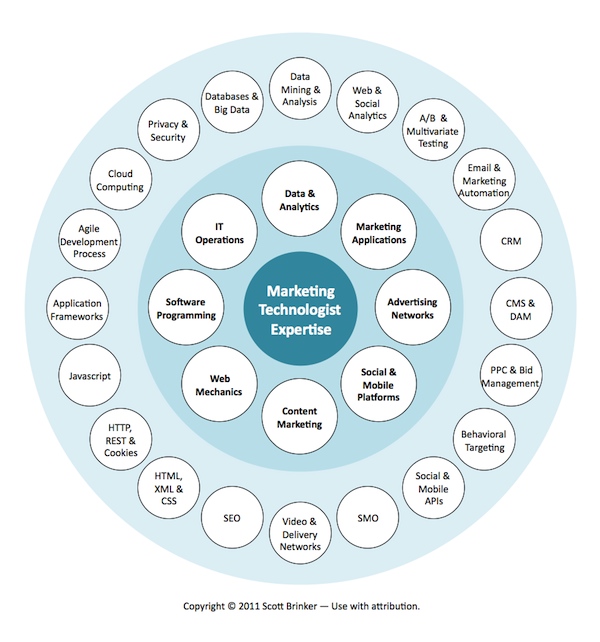The term “marketing technologist” is sometimes broadly interpreted as anyone who wields technology in the marketing domain. However, since everyone in marketing should be doing that to some degree these days, it makes sense to distinguish what a marketing technologist does above and beyond that.
I’ve drafted a set of skills and knowledge that I propose delineate a marketing technologist:
In the inner ring are eight areas of expertise that I think every marketing technologist should be familiar with — and proficient or expert in at least two or three of them:
- Data & Analytics — management, measurement and manipulation of the fuel of digital marketing
- Marketing Applications — configuration, operation, and integration of marketing software
- Advertising Networks — managing and optimizing the complete digital advertising ecosystem
- Social & Mobile Platforms — Facebook, Twitter, LinkedIn, etc. and their tools and APIs
- Content Marketing — navigating the entire lifecycle of content marketing, especially SEO
- Web Mechanics — a clear and thorough understanding of the web and browser platforms
- Software Programming — how to speak, read and write the lingua franca of technology
- IT Operations — independently leveraging cloud computing and a strong liaison with IT
Different marketing technologists will combine different strengths. For instance, a web developer working in marketing might specialize in software programming, web mechanics, and IT operations. A data scientist might focus primarily on data & analytics, IT operations, and marketing applications. An SEO expert would logically master content marketing, web mechanics, and data & analytics.
From these core areas of knowledge, we can extrapolate more specific capabilities (the outer ring), along with a few links to get you started with any you’re not familiar with:
- Data Mining & Analysis — a data scientist who “can obtain, scrub, explore, model and interpret data, blending hacking, statistics and machine learning”, see the Data Science Venn Diagram
- Web & Social Analytics — technical and interpretive mastery of tools from Google Analytics (web) to Radian6 (social media), see Avinash Kaushik and the Web Analytics Association
- A/B & Multivariate Testing — a mix of analytics and content marketing that embraces test-driven marketing, see Conversion Science, Which Test Won? and ion’s post-click marketing blog
- Email & Marketing Automation — configuration and operation of semi-automated “nurturing” platforms, see Email Insider, MarketingAutomationSoftware.com, Propelling Brands and Eloqua
- CRM — customer relationship management systems such as Salesforce, the backbone of modern marketing, new social CRMs, see CustomerThink and Destination CRM
- CMS & DAM — (web) content management systems and digital asset management, metadata organization, see CMS Wire, Digital Asset Management, Drupal and Nimble report
- PPC & Bid Management — tools and tactics for pay-per-click advertising on Google, Bing, Facebook, see PPC Hero, Clix Marketing, WordStream, Click Equations and this post
- Behavioral Targeting — audience targeting/segmentation and data exchanges in ad networks, remarketing or interest-based advertising, see Behavioral Insider, BlueKai and Quantcast
- Social & Mobile APIs — go beyond canned applications, directly tap platform feeds, make mashups, see Facebook APIs, Twitter APIs, Google APIs, Mashery and Programmable Web
- SMO — social media optimization to maximize content distribution and influence, sharing buttons, badges and widgets, see Open Graph protocol, OAuth, Rohit’s 16 SMO rules and 5 new rules
- Video & Delivery Networks — video production, formatting, encoding and delivery, the technology and economics of content delivery networks, see Akamai, CloudFront, Ooyala and Brightcove
- SEO — search engine optimization to maximize organic rankings on Google/Bing, see SEOmoz, 100% Organic, Google Rich Snippets, GinzaMetrics and Conductor
- HTML, XML & CSS — complete fluency in web markup, browser capabilities, features of the new HTML5, see QuirksMode, CSS Zen Garden, XML.com and Visibone’s HTML cheatsheet
- HTTP, REST & Cookies — the protocols of the web, IPs and DNS, URLs and RESTful interfaces, how SSL works, caching, cookies and 3rd-party cookie constraints, see Fielding/Taylor paper
- Javascript — the client-side language for web applications, Web 2.0 behaviors, Ajax, see jQuery, Mozilla Developer Network, Visibone’s Javascript card and regular expression cheatsheet
- Application Frameworks — server-side development of web applications, iPhone and Android apps, your own utilities and customizations, see PHP, Rails, Django, Stripes and ASP.NET MVC
- Agile Development Process — experience with agile software development such as Scrum, adaption to agile marketing, see Agile Manifesto and Agile Marketing blog
- Cloud Computing — evaluate, setup, operate and monitor cloud-based infrastructure, platforms, and applications, loosely-coupled integrations, see Amazon Web Services, Heroku and Azure
- Privacy & Security — privacy policies, how to enforce them, network and cloud security, see Google Privacy Principles, Network Security Blog and CERT
- Databases & Big Data — relational databases and SQL, NoSQL data stores, 3rd-party data sets, large-scale data processing, see Factual, InfoChimps, Hadoop and Google’s MapReduce paper
This list isn’t comprehensive, but I think it covers the “common ground” of many marketing technologists. Depending on your business, you might also leverage technical depth with e-commerce platforms, transaction processing, industry technical standards, integrated product technologies such as RFID, etc.
What would you add to this list?
Of course, technology is just a tool — don’t forget the marketing in making marketing technology sing!
Get chiefmartec in your inbox
Join 42,000+ marketers and martech professionals who get my latest insights and analysis.
